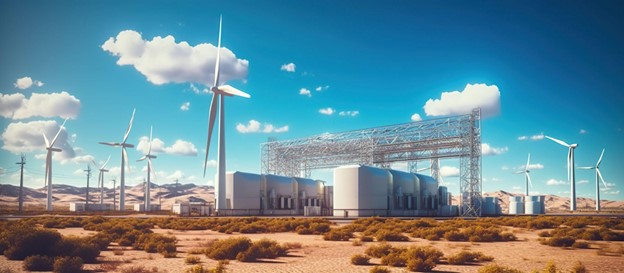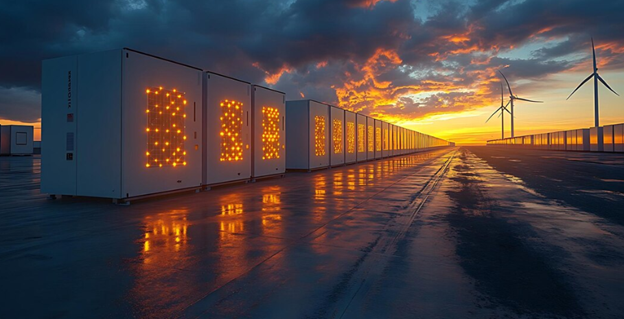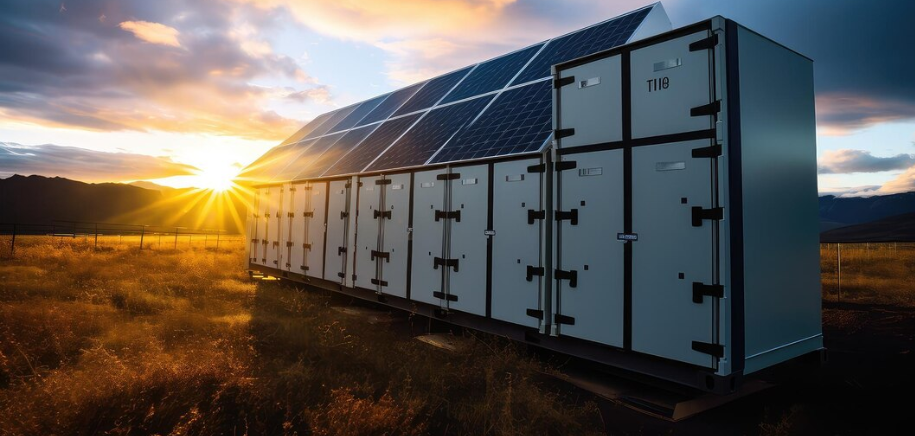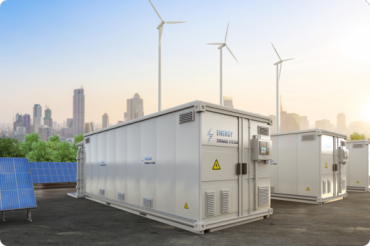Jump Ahead
What is a Battery Energy Storage System?
The global push for renewable energy continues and it enhances the demand for efficient energy storage solutions as well. This shift towards efficient energy solutions is driven by battery storage which enables energy to be stored and used when needed. This ultimately reduces the reliance on the grid.
Whether energy is needed for residential homes or large-scale businesses, battery energy storage systems (BESS) are significant in consistent and reliable power supply. Battery energy storage captures renewable energy when it is available and releases it when energy is required, enabling an efficient and sustainable electricity grid. In this guide you’ll find about the battery storage system, its types and working in detail.
Working of Battery Energy Storage
Battery energy storage works on a technology which upon charging allows the conversion of electrical energy into chemical energy. Also, this technology allows the electrical energy to be stored in batteries for later use. These batteries work simply by storing excess energy generated during periods when demand is low and discharging it when the demand is higher. Their working is a simple three step formula: Charge, Optimize and Discharge.
- Charge: During daylight these battery storage systems are charged by clean electricity generated by solar
- Optimize: The battery energy storage system utilizes intelligent battery software and uses algorithms to coordinate solar production, weather patterns and utility rate structures to optimize when the stored energy is used.
- Discharge: Energy is discharged when needed during the times of high usage from the battery storage system. This helps in avoiding costly electricity charges.
- The technology behind BESS batteries makes them efficient in power supply management. From home battery storage solutions that enable energy independence to industrial applications that stabilize the power grid, these batteries are transforming how energy is managed across different sectors.

Key Components of a Battery Energy Storage System
There are several essential components in a battery storage system that work together to store and release power. One of the main elements is the battery for storage, storing energy in chemical form. Lithium-ion batteries are mostly preferred for their higher energy density and efficient power supply. However, advancements in alternative chemistries like flow batteries and solid-state, are expanding possibilities.
Furthermore, the inverter plays a significant role by converting stored energy from Direct Current (DC) to Alternative Current (AC). This is used by most of the electrical devices. Lastly, the control systems are crucial in managing and discharging processes for better performance and longevity of the overall system.
These components, when combined, make an effective system of power storage that can be used in businesses, homes and industrial applications. For reliable and consistent power supply, at HIS-energy our energy management system stands out.
Understanding the Benefits of Battery Energy Storage
These batteries offer multiple advantages for businesses as well as homeowners, which makes them crucial components in modern energy requirements. Here’s how it facilitates you:
Energy Independence and Cost Efficiency
Residential energy storage offers one of the premium advantages of obtaining energy independence. Home owners can reduce their reliance on the grid by storing excess energy from renewable sources like solar panels. This not only lowers their electricity bills but also ensures protection against fluctuating energy costs.
Reduced Reliance on the Grid
With these batteries, energy is stored to be used during peak hours or power outages. This reduces the dependency of homeowners on the grid as it provides a continuous power supply even in emergencies. This reliable power storage system is also utilized by businesses to avoid costly downtime, high electricity demand charges, avoiding electricity peaks and increasing share of self produced renewable energy.
Improved Usage of Renewable Energy
Battery energy storage increases the efficiency of renewable energy sources such as solar and wind. The energy stored provides continuous power flow, hence maximizing the potential for clean energy. These batteries also help you in embracing sustainability.

Reduce carbon footprint
Installing BESS at your home or business place is an exceptional way to minimize your carbon footprint. It utilizes renewable energy which lowers your greenhouse gas emissions, ultimately reducing pollution. Besides this, BESS also wastes less power than other energy sources, which makes it an eco-friendly and sustainable battery storage system.
Grid Stabilization and Load Management
Besides individual benefits, these batteries mean grid stabilizing by managing electricity loads. When energy stored is released during peak demand duration, it prevents grid overloads and lowers the need for additional power generation. This results in contributing to a resilient and balanced energy framework.
Types of Battery Energy Storage Systems
There are different types of battery energy storage systems (BESS). Each battery has characteristics suitable for different applications. Here’s the overview of these batteries:
Lithium-Ion Batteries
These batteries are one of the most used in BESS battery systems due to their high energy density, longevity and efficiency. They are considered ideal for residential and commercial applications. Lithium-ion batteries are known for quick charging and discharging abilities.
The versatility and performance of these batteries make them a preferred choice for industrial battery storage and large grid-scale energy systems. To explore more about premium battery storage turnkey solutions, find more at HIS-Energy 215-A and 233-L all-in-one battery solutions.
Lead-Acid Batteries
Lead acid batteries are affordable battery solutions. However, they are less efficient as compared to lithium-ion batteries. They are used in some industrial and backup power applications but they have low density and shorter lifespan. That is why they are less suitable for long term energy storage application. However, lead-acid batteries are used in areas with limited grid infrastructure and less technological advancement.

Flow Batteries
Flow batteries are known for their longer-duration energy storage solutions. These batteries are also called vanadium redox flow batteries. They are suitable for large-scale operations in businesses and industries where consistent and continuous energy supply is required. When compared to lithium-ion they have a low energy density. However, they are capable of providing long-term storage for businesses and utilities but are very expensive currently!
Solid-State Batteries
These batteries are also called the next generation of BESS battery technology. The reason is their higher energy density, safety and longer lifespan than lithium-ion batteries. Although they are still in development for mainstream use these batteries are significant for commercial and residential storage. It is believed that they might outperform existing battery technologies shortly.
Choosing the ideal BESS battery largely depends on your usage and particular energy needs. Therefore, we at HIS-Energy recommend using lithium-ion batteries for your home and business applications as they ensure safety and reliable power supply.
Applications of Battery Energy Storage in Homes and Businesses
Battery energy storage systems are widely used across different settings such as homes, businesses and other large-scale industrial operations. Here’s how they ensure power supply:
Residential Applications
In homes, these battery systems enable self-consumption of renewable energy as they store it by solar panels during the day. In residential settings, battery storage ranges from 5 to 20 kWh. This amount of stored energy is sufficient to offset peak usage hours or provide backup during power outages.
Commercial and Industrial Applications
In commercial settings, these batteries are leveraged to store energy during periods of low demand and use it during peak hours to avoid high electricity rates. For businesses, multi-unit dwellings or other commercial buildings these energy storage systems typically offer 30 kWh to 2000 kWh. The benefit of these batteries in industrial and businesses is not only confined to electricity rates as it also offers energy efficiency and sustainability. This ultimately facilitates peak shaving by reducing grid reliance, ensuring energy independence and significant cost reduction.
Choosing the Right Battery Energy Storage System with HISBatt
Whether you’re looking for premium battery solutions or a complete energy management system, we at HIS-Energy offer them both. Our batteries 233-L and 215-A are designed to meet your energy requirements. Our battery storage systems are compatible across applications including, peak shaving, self-consumption, energy trading and so on.
If you’re seeking a reliable, consistent and efficient energy setup, reach out to us and we will help you get started. Our team of experts will offer personalized guidance in selecting the best battery energy storage solutions.
Need Reliable and Efficient BESS for Your Business?
Get in touch with our team to discuss your energy storage requirements. Book a consultation with us and we will help you establish a complete BESS solution for your home or business.
Get a quote
Frequently Asked Questions (FAQs)
How is commercial battery storage different from residential?
Commercial batteries handle large energy requirements such as peak shaving and load shifting. Whereas residential batteries focus on self-consumption, backup power and cost savings.
How can I know what battery system is suitable for my business?
Choosing a suitable battery storage system can be challenging sometimes. You should look for factors like load profile, available PV energy, flexible loads, energy demand, available space etc. If you’re still facing trouble finding the right fit, get in touch with us and we will help you.
Can HIS-energy Batteries be used for renewable energy systems like solar?
Yes, our battery storage system is fully compatible with renewable energy setups. With our batteries, you can store excess power for later use.
How long does your battery last?
Our batteries are designed with durability, modularity and efficiency in mind. They can withstand wear and tear and ensure a long lifespan upto 20 years. However certain factors like usage and maintenance might affect the longevity of these batteries.




